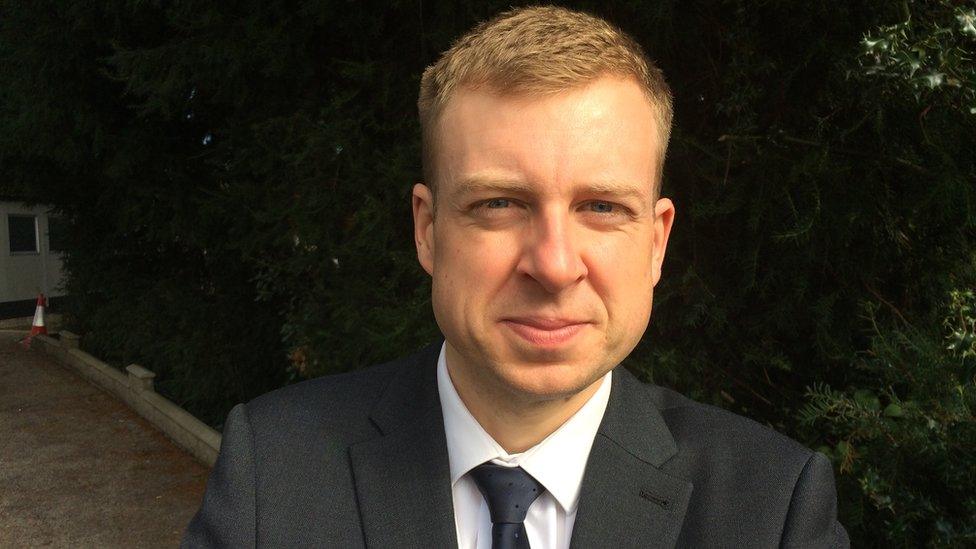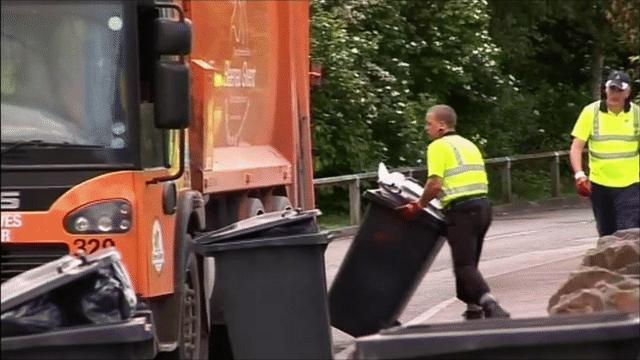Shake-up proposed for how councillors are elected
- Published
- comments

The way councillors are elected could depend on the local authority they are in, if proposed changes by the Welsh Government were given the go-ahead.
Local Government Secretary Mark Drakeford wants to let councils decide which voting system they use.
"First past the post" is currently used but he wants feedback on offering a form of proportional representation.
The Conservatives said the priority should be to provide "efficient, well run-services", not electoral reform.
Mr Drakeford has also proposed lowering the voting age to 16.
"The white paper explores the idea of permissive PR in which just as the national assembly will be able to decide on our voting system, so will individual councils," he told BBC Radio Wales.
"They will be able to decide between first past the post and STV [Single Transferable Vote, external] as a way on conducting elections in their area.
"It would be a decision entirely for the councils themselves."

First Past The Post v Single Transferable Vote
With FPTP, voters make one choice who they want to elect and the candidate with the most votes win. In wards with two or more councillors up for election, voters will be asked to vote for two or more candidates. If two seats are up for election, the two candidates with the most votes are declared the winners.
STV allows voters to put numbers next to candidates in order of preference. Candidates then need to reach a set share of the votes, determined by the number of positions to be filled. The system is already used in local elections in Northern Ireland and Scotland.

The white paper also explains how councils will have to work together to deliver services, after the ditching of earlier plans to merge the 22 councils to eight or nine.
Councils which want to merge with their neighbours have been invited to do so, but the controversial merger plans - which had angered some council leaders - were abandoned after the assembly election in May.
Instead, they will be required to deliver services - including social services and aspects of education - under a system of "mandatory regional working".
'More resilient'
Ministers had intended to use the same boundaries as the seven local health boards, but councils will instead be asked to offer their own options.
In addition, councils will be grouped into three regions - south-east Wales, south-west and central Wales, and north Wales - to work together on developing the economy and on transport.
Decisions will be taken by joint committees of councillors, with the authorities pooling their budgets.
Mr Drakeford said: "This white paper is not about change for change's sake.
"Our councils are working against a backdrop of extraordinary austerity and some services are facing a great deal of pressure.
"Local government reform is essential if we're to make these services stronger and more resilient to cope with the demands of the future."

The 22 councils had been facing plans to merge to as few as eight or nine authorities
Darren Hughes, acting director of the Electoral Reform Society Cymru, welcomed the white paper, saying it showed ministers were "serious about empowering voters and revitalising democracy in Wales".
He said a "fairer" voting system would be a "big step forward".
"Moving away from the Westminster winner-takes-all system across the board would mean everyone's vote counted in local elections, drawing to a close the era of wasted votes and 'holding your nose'," Mr Hughes said.
'Muddy the waters'
Mr Drakeford said he wanted to see a "new relationship" between councils and the public - and between councils and the Welsh Government.
But Conservative local government spokeswoman Janet Finch-Saunders warned there was a danger that "sub-dividing local government into different regional layers" would "muddy the waters, taking decision-making further away from residents" while still not reducing the "complexity of the public sector in Wales".
Plaid Cymru AM Sian Gwenllian told a Senedd debate her party would go further in making STV mandatory for all councils, asking: "Wouldn't that make it easier for everyone to understand?"
UKIP's Gareth Bennett told the same debate that the proposals on STV do not go far enough, but he welcomed Mr Drakeford's "movement in this direction".
The contents of the white paper, first outlined by Mr Drakeford in the autumn, show a departure from the advice of a high-level commission which recommended mergers in January 2014.
The Williams Commission called for fewer, bigger councils and criticised the complexity of the public sector.
Years of pressure from ministers for services to collaborate had resulted in "multiple overlapping and layered partnerships with unclear governance which often added little value and blurred lines of accountability", it said.
The Welsh Local Government Association, which previously opposed compulsory mergers, welcomed the white paper.

Analysis by Daniel Davies, BBC Wales political correspondent

"After consultation, the vast majority of what we have asked for he has put in his white paper."
That statement, from a local council leader, tells you a lot about Mark Drakeford's plans.
The carrot of voluntary mergers and the stick of forced mergers both failed.
So Mr Drakeford has listened to what councils want and offered them regional partnerships for running services.
It is three years ago this month since the high-level Williams Commission recommended mergers.
Mr Drakeford's white paper stands a better chance of success than the policy spawned by that report.
But he will have to tread carefully to avoid adding to one of the big problems identified by that commission: namely, that years of tinkering has left Wales with a public sector that is already far too complicated.
- Published4 October 2016

- Published19 October 2016

- Published20 January 2014
